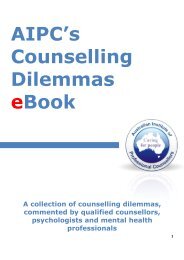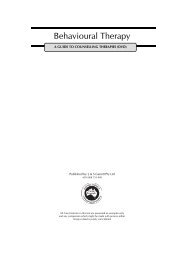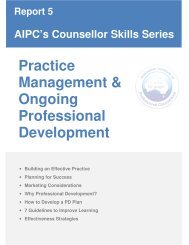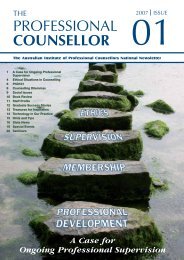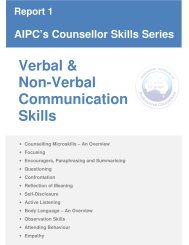Why Diversity? - Counselling Connection
Why Diversity? - Counselling Connection
Why Diversity? - Counselling Connection
- No tags were found...
Create successful ePaper yourself
Turn your PDF publications into a flip-book with our unique Google optimized e-Paper software.
AIPC’s Counsellor Skills Series, Report 3The Defiant Child - Defiant children tend to be stubborn, negative and controlling. Theyreact in negative ways to most situations usually getting stuck in the “no” stage. Their defiantbehaviour can develop into negative patterns. These patterns can appear at any age andextend into all areas of their life. During the ages of two and four, emotional ideas andemotional thinking tends to become rigid and inflexible.The defiant child likes to be very controlling insisting that they are right about everythingsuch as bedtime, the clothes they are wearing and the food they eat. As they start schoolthey appear to be more concrete and focused on planning small pieces of their own worldinstead of accepting all of it. As they are very bright and hardworking, they appear to haveperfectionist qualities putting high expectations on themselves. They tend to cope with theirtendency to be overwhelmed by restricting any emotional input and avoiding challengingsituations.The Inattentive Child - Children with attentive problems may not respond well to anythingthat appears complex. It can be very difficult to have a conversation with them because theychange from one topic to another. Their attention span is limited causing them to follow verylimited instruction and their inability to maintain concentration makes them poor listeners.Having this difficulty usually results in the child finding it difficult to express themselves, forexample describing their day or answering a question that the teacher asks.Inattentive children appear to be paying attention in the classroom but while their bodiesremain stationary their minds wander aimlessly through a universe of ideas and images.Frequently, their academic performance will reflect their lack of connection with classroomactivities and their lack of assertiveness makes it easy for them to be overlooked and lost inthe crowd (Moore, 2000).The inattentive child tends to be disconnected from thought, expression, creativity, books,words, people and their feelings. These children are usually branded with having AttentionDeficit Disorder (ADD). Children who have this disorder can have a very low self-image andself-esteem due to experiencing repeated failures, misunderstandings and mislabels e.g.being called dumb, stupid, spacey and lazy.Inattentive children are predominately classed as “daydreamers”; they are distracted easily,make careless mistakes and are usually overwhelmed by stimulating situations. This isunlike children with Attention Deficit/Hyperactive Disorder (ADHD) who daydreamoccasionally, fidget, talk excessively, have problems staying seated and are usuallyenergized by stimulating situations.Inattentive children require a great degree of self-acceptance and patience with themselvesbecause of the frustration they may encounter. In helping these children the focus needs tobe on their strengths rather than always correcting their weaknesses.Learn to be a qualified Counsellor withAustralia’s only national counselling educationspecialist...Like so many of our graduates, you will be ableto create lasting change and have a majorpositive influence on the wellbeing of people inyour community!www.aipc.net.au/lzPage 12



